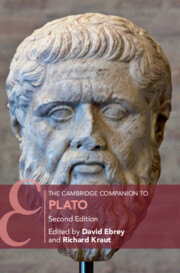Book contents
- The Cambridge Companion to Plato
- Other Volumes in the Series of Cambridge Companions
- The Cambridge Companion to Plato
- Copyright page
- Contents
- Contributors
- Acknowledgments
- Chronology
- Abbreviations
- 1 Introduction to the Study of Plato
- 2 Plato in his Context
- 3 Stylometry and Chronology
- 4 Plato’s Socrates and his Conception of Philosophy
- 5 Being Good at Being Bad: Plato’s Hippias Minor
- 6 Inquiry in the Meno
- 7 Why Erōs?
- 8 Plato on Philosophy and the Mysteries
- 9 The Unfolding Account of Forms in the Phaedo
- 10 The Defense of Justice in Plato’s Republic
- 11 Plato on Poetic Creativity: A Revision
- 12 Betwixt and Between: Plato and the Objects of Mathematics
- 13 Another Goodbye to the Third Man
- 14 Plato’s Sophist on False Statements
- 15 Cosmology and Human Nature in the Timaeus
- 16. The Fourfold Classification and Socrates’ Craft Analogy in the Philebus
- 17 Law in Plato’s Late Politics
- Bibliography
- Index Locorum
- General Index
- Other Volumes in the Series of Cambridge Companions (continued from page iii)
16. - The Fourfold Classification and Socrates’ Craft Analogy in the Philebus
Published online by Cambridge University Press: 21 July 2022
- The Cambridge Companion to Plato
- Other Volumes in the Series of Cambridge Companions
- The Cambridge Companion to Plato
- Copyright page
- Contents
- Contributors
- Acknowledgments
- Chronology
- Abbreviations
- 1 Introduction to the Study of Plato
- 2 Plato in his Context
- 3 Stylometry and Chronology
- 4 Plato’s Socrates and his Conception of Philosophy
- 5 Being Good at Being Bad: Plato’s Hippias Minor
- 6 Inquiry in the Meno
- 7 Why Erōs?
- 8 Plato on Philosophy and the Mysteries
- 9 The Unfolding Account of Forms in the Phaedo
- 10 The Defense of Justice in Plato’s Republic
- 11 Plato on Poetic Creativity: A Revision
- 12 Betwixt and Between: Plato and the Objects of Mathematics
- 13 Another Goodbye to the Third Man
- 14 Plato’s Sophist on False Statements
- 15 Cosmology and Human Nature in the Timaeus
- 16. The Fourfold Classification and Socrates’ Craft Analogy in the Philebus
- 17 Law in Plato’s Late Politics
- Bibliography
- Index Locorum
- General Index
- Other Volumes in the Series of Cambridge Companions (continued from page iii)
Summary
The chapter offers a reading of Socrates’ fourfold classification, at Philebus 23c-27c of “all the things now in the universe” into what is without limit (the apeiron), limit (peras), mixtures of these two (the meikton) and the cause of said mixtures (aitia). Contrary to the classification’s more typical treatment as a general window onto Plato’s late ontology and whatever may be its broader horizons, this classification is argued to be tailored to the project of the dialogue, directed to an analysis of the metaphysics of craft objects. In developing and explaining the classification, Socrates puts in place material for an analogy drawn from the craft of medicine to the effect that as medicine stands to health so stands some as yet unidentified craft to the good condition of soul that is the dialogue’s central focus, responsible for the happy human life. In thus articulating a framework for the historically influential idea of a craft of human living, Socrates provides a heuristic through which, in the remainder of the dialogue, the life’s character and elements may be systematically explored with a view to the dialogue’s overall contest between pleasure and intelligence.
Keywords
- Type
- Chapter
- Information
- The Cambridge Companion to Plato , pp. 493 - 521Publisher: Cambridge University PressPrint publication year: 2022



